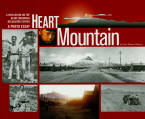
Heart Mountain
A Photo Essay - Reflection On the Heart Mountain Relocation Center
By Eiichi Edward Sakauye2000, 176 pages, Paperback.

 |
Heart Mountain
By Eiichi Edward Sakauye |
ORDER -- Item #2892, Price $30.95
In creating this book I hope the photographs and insights will enrich our understanding of what life was like in a Relocation Center, the resilience of its people and their struggle to govern themselves.
In this great nation of immigrants, no ethnic group experienced a more dramatic crisis at the outbreak of World War II than did people of Japanese ancestry. Yet, men and women I knew retained a faith in the basic ideals of America and were determined to establish their rights to full equality and justice by making sacrifices in the battlefield with the 442nd Regimental Combat team, the 100th Battalion, the Military Intelligence Service, as well as working in war plants and fields away from home. For all of us there was soul searching and supreme patience and sacrifice. On our return home, it meant rebuilding for the future, and challenging the courts to right the injustice we had experienced-all to benefit America, the country we loved most.
The story of the Japanese Americans of this period should give hope to all those who are struggling for their rights, giving courage and faith that American ideals can be achieved despite initial frustration and shattered dreams. Ironically, the man who signed the documents for our relocation camp incarceration, Franklin D. Roosevelt said it best: "Americanism is a matter of mind and heart." Americanism is not, and never was a matter of race and ancestry.
Eiichi Edward Sakauye
Book Description from Back Cover
During W.W.II, the US government forced 110,000 Japanese Americans to move from their homes and live in ten Relocation Centers. Heart Mountain in northern Wyoming was one of these "camps" for a little over 11,000 people from California, Oregon and Washington. Between August 12, 1942 and November 10, 1945, they voted in a form of self government, produced much of their own food, and created a caring community to help salvage the spirit of their people. These unique photographs focus on the activities of the Heart Mountain community and are a tribute to the resilience of men and women who made the most of their incarceration behind barbed wire.
Excerpt From the Preface
During my two and a half years of incarceration in Heart Mountain, I served as a Weather Bureau Observer, Post Master for blocks 23, 24 and 30, an Assistant Farm Superintendent and a Block Manager. Being interested in photography, I found the rules prohibiting picture taking of the facility frustrating. Finally, after being there for a year, I asked Guy Robertson, the Project Director for Heart Mountain, "How good a citizen am I?" He answered, "An excellent citizen!" "Am I as good as those Japanese-Americans who frequently visit our camp but live in Wyoming?" He answered, "Yes." "Then, why then should they be able to own cameras and take pictures of the camp while I cannot?" Within two days a message was sent to Washington D.C. and Dillon Meyer, the head of the War Relocation Authority, wired his approval for me to photograph Heart Mountain, thus paving the way for all to photograph the camp for the first time. After wiring George Abel Jr., I got my cameras back and began taking the 8 mm movie and still photos in this book. The prohibition of picture taking explains why so many important aspects of camp life were never recorded. Despite problems in their reproduction, this book includes movie film clips, because they uniquely depict moments of historical significance. They are included knowing that many former internees will see in them not just dim photos, but clear and evocative memories.
San Jose, California
About |
Contact |
New |
Specials |
Browsing |
Ordering |
Conference |
Links |
Help
Copyright © 2004 by AACP, Inc.
Most recent revision June 27, 2004